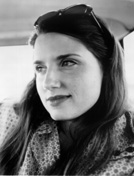 |

Comment
on this story
What:
Jolie Holland with Leslie Woods and Dark Mountain Orchid
When:
Friday, Aug. 6, 8 p.m.
Where:
Fifth floor of the Woodruff Building, above the Downtown Grill & Brewery
Cost:
$7
|
Of The Moment
As a buzz swirls around her, Jolie Holland tries to focus
by Joe Tarr
In the eyes of the music press, the songs of Jolie Holland will soon be radiating out of radios everywhere, her name known by yuppies and hipsters alike.
Rolling Stone—the granddaddy of American music mags, now merely the chronicle of common denominator popular taste—designated her among a handful of “new Norah” Joneses. She’s also gotten significant press from Entertainment Weekly, Esquire, No Depression and Magnet, among others, for her inventive brew of traditional folk, blues and jazz. The buzz is well deserved and Holland is flattered, if a bit flustered by it.
“I wrote my songs for my friends. I don’t know all these other people who are buying my records,” she says.
But a friend of hers recently told her a story to keep it all in perspective. A writer and train-hopper, the friend was traveling down in Mexico and had been picked up by some seedy cops. “He looked liked a dirty punk, and he got kidnapped by these drunk cops,” Holland says. They drove him outside of town, harassed him and roughed him up. He wasn’t sure what might happen.
“He was scared for his life,” Holland says. “He was sitting in the cop car looking at the moon. He said my songs were stuck in his head. That’s more important to me than anything: having a friend thinking they might die and your songs help them through,” she says. “It’s more important to meet your own criteria for success than to meet someone else’s.”
It’s probably because of Holland’s personal standards that her music resonates so well with others. Her songs hark back to early eras of American music, roughly from the late ’20s through the ’50s—blues, jazz, traditional folk music, country. She’s inspired by the likes of Leadbelly, Billie Holliday, the Carter Family, Nina Simone and Mississippi John Hurt.
The genre-bouncing makes her sound difficult to classify. In a way, it breaks down the categories record companies began creating in the late ’20s at the birth of the record industry. Those crude categories meant little to musicians, but genre tags were convenient ways to market records.
“I think genres are mostly about marketing, and I choose to ignore that,” she says. “There’s always been a real blurring of music. Jimmy Rodgers recorded with Louis Armstrong. John Coltrane was a big fan of Hank Williams. There’s just good music. There’s good music, and there’s bad music.”
She doesn’t like getting lumped into the trendy Americana genre. “I had no idea what Americana actually was. It sounded like it might be cool to me. Then I was on this Americana show, and it was shit, so boring. To me it sounded like the new incarnation of light rock, just bad and boring and fluffy,” she says.
Holland’s isn’t a nostalgic imitation, but she clearly looks back for inspiration. There’s an ethereal quality to songs like “Darling Ukelele” and “Poor Girl’s Blues”—sounding modernistic but rooted in some other America. Her tunes are at home on Anti Records with label mates Tom Waits, Joe Henry, Merle Haggard and Nick Cave. The instrumentation is also eclectic.
The way she enunciates her lyrics is enough to hook you: she draws out certain words, wrapping them around the melody, such as on “Goodbye California.” The way she drawls, “You motherfucker/ I wanted you” at the end of “Do You?” is priceless.
A native of Texas, Holland co-founded the acclaimed Canadian folk group The Be Good Tanyas, but she left after one record. She moved to San Francisco where she cut some rough songs, which weren’t originally intended to be released but ended up as her debut, Catalpa. With this year’s follow up, escondida, the buzz is growing.
Holland says she relies mostly on inspiration in writing her songs. “I don’t try to write songs for the most part. I just let them come to me. It’s about having my ears open to realize when the song is coming through,” she says. “I write most of my songs really quickly, within 15 minutes. I’m interested in a really compact sound, which means it all has to do with the same moment.”
When she writes her songs, she says she thinks about her friends and the people around her. As long as she can keep doing that, she’s happy letting Norah Jones be Norah Jones.

August 5, 2004 • Vol. 14, No. 32
© 2004 Metro Pulse
|
|